DLR presents technologies for decarbonisation across the economy
Monday, 30 May 2022 07:47 The German Aerospace Center will be presenting technologies, innovations and successful transfer and spin-off projects at Hannover Messe 2022. From 30 May to 2 June, at the 120-square-metre stand (Energy Solutions, Hall 13, D18), visitors will be able to gain an insight into DLR's research for a future climate-friendly energy supply system and for the decarbonisation of industrial processes and
The German Aerospace Center will be presenting technologies, innovations and successful transfer and spin-off projects at Hannover Messe 2022. From 30 May to 2 June, at the 120-square-metre stand (Energy Solutions, Hall 13, D18), visitors will be able to gain an insight into DLR's research for a future climate-friendly energy supply system and for the decarbonisation of industrial processes and Tiny robotic crab is smallest-ever remote-controlled walking robot
Monday, 30 May 2022 07:47 Northwestern University engineers have developed the smallest-ever remote-controlled walking robot - and it comes in the form of a tiny, adorable peekytoe crab.
Just a half-millimeter wide, the tiny crabs can bend, twist, crawl, walk, turn and even jump. The researchers also developed millimeter-sized robots resembling inchworms, crickets and beetles. Although the research is exploratory a
Northwestern University engineers have developed the smallest-ever remote-controlled walking robot - and it comes in the form of a tiny, adorable peekytoe crab.
Just a half-millimeter wide, the tiny crabs can bend, twist, crawl, walk, turn and even jump. The researchers also developed millimeter-sized robots resembling inchworms, crickets and beetles. Although the research is exploratory a Vacuum soak for satellite brain
Monday, 30 May 2022 06:16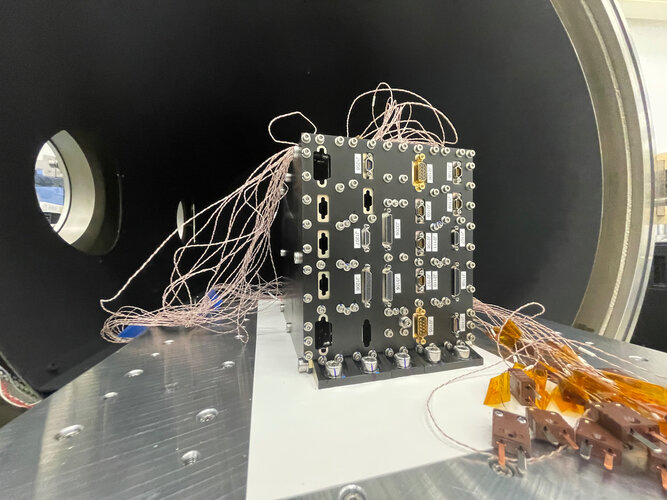 Image:
Vacuum soak for satellite brain
Image:
Vacuum soak for satellite brain Next SLS countdown rehearsal scheduled for June 19
Monday, 30 May 2022 01:20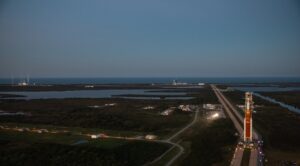
NASA has tentatively scheduled the next attempt to fuel the Space Launch System and go through a practice countdown for June 19, two weeks after the vehicle returns to the launch pad.
Why Did Mars Dry Out? New Study Points To Unusual Answers
Sunday, 29 May 2022 10:47 Mars once ran red with rivers. The telltale tracks of past rivers, streams and lakes are visible today all over the planet. But about three billion years ago, they all dried up - and no one knows why.
"People have put forward different ideas, but we're not sure what caused the climate to change so dramatically," said University of Chicago geophysical scientist Edwin Kite. "We'd really like
Mars once ran red with rivers. The telltale tracks of past rivers, streams and lakes are visible today all over the planet. But about three billion years ago, they all dried up - and no one knows why.
"People have put forward different ideas, but we're not sure what caused the climate to change so dramatically," said University of Chicago geophysical scientist Edwin Kite. "We'd really like Up, Up and Away - Sols 3487-3490
Sunday, 29 May 2022 10:47 Our intrepid rover engineers again successfully navigated Curiosity a little higher up Mount Sharp (~5 m) and ~40 m on the ground, away from our previous location. The terrain beneath the rover included striated, dusty bedrock and sand ripples with coarse lag deposits.
As a member of the geology/mineralogy planning team and the APXS payload uplink lead today, I chose several interesting ar
Our intrepid rover engineers again successfully navigated Curiosity a little higher up Mount Sharp (~5 m) and ~40 m on the ground, away from our previous location. The terrain beneath the rover included striated, dusty bedrock and sand ripples with coarse lag deposits.
As a member of the geology/mineralogy planning team and the APXS payload uplink lead today, I chose several interesting ar New meteor shower? How many meteors will I see, really?
Sunday, 29 May 2022 10:47 Astronomers are excited about the possibility of a new meteor shower May 30-31. And that excitement has sparked a lot of information about the tau Herculids. Some has been accurate, and some has not.
We get excited about meteor showers, too! But sometimes events like this don't live up to expectations - it happened with the 2019 Alpha Monocerotid shower, for example. And some astronomers p
Astronomers are excited about the possibility of a new meteor shower May 30-31. And that excitement has sparked a lot of information about the tau Herculids. Some has been accurate, and some has not.
We get excited about meteor showers, too! But sometimes events like this don't live up to expectations - it happened with the 2019 Alpha Monocerotid shower, for example. And some astronomers p Commercial Space Exec: Hands-On Work Can Launch Careers
Sunday, 29 May 2022 10:47 Tyler Grinnell ('08) worked at Kennedy Space Center while he was still an Aerospace Engineering student at Embry-Riddle, juggling a full load of classes.
"That was a dream come true for me to be able to work on the space shuttle program while I was just out of my sophomore year," he said, at the university's latest Presidential Speaker Series event.
That real-world experience propell
Tyler Grinnell ('08) worked at Kennedy Space Center while he was still an Aerospace Engineering student at Embry-Riddle, juggling a full load of classes.
"That was a dream come true for me to be able to work on the space shuttle program while I was just out of my sophomore year," he said, at the university's latest Presidential Speaker Series event.
That real-world experience propell OneWeb satellite to be deorbited at the end of its active lifetime
Sunday, 29 May 2022 10:47 The world's first mission to remove several small telecommunications satellites from orbit once they reach the end of their operational service is about to start building and testing its prototype spacecraft.
British-based in-orbit servicing company Astroscale - working in an ESA Partnership Project with satellite operator OneWeb - will begin manufacturing the first commercial "servicer" p
The world's first mission to remove several small telecommunications satellites from orbit once they reach the end of their operational service is about to start building and testing its prototype spacecraft.
British-based in-orbit servicing company Astroscale - working in an ESA Partnership Project with satellite operator OneWeb - will begin manufacturing the first commercial "servicer" p China's space tracking ship departs for 100th mission
Sunday, 29 May 2022 10:47China rolls out rocket for Shenzhou-14 crewed mission
Sunday, 29 May 2022 10:03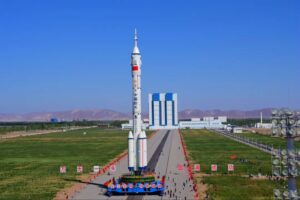
China is preparing to launch three astronauts to its Tiangong space station to oversee a crucial phase of construction of the orbital outpost.
The post China rolls out rocket for Shenzhou-14 crewed mission appeared first on SpaceNews.
NASA to reexamine space-based solar power
Saturday, 28 May 2022 16:22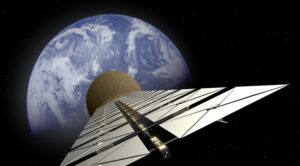
NASA is starting a study to reexamine the viability of space-based solar power, a long-touted solution to providing power from space that may be getting new interest thanks to technological advances and pushes for clean energy.
Starlink approved in Nigeria and Mozambique, says Elon Musk
Friday, 27 May 2022 20:42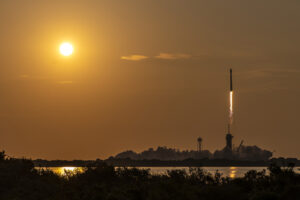
SpaceX said May 27 that Nigeria has joined Mozambique as the first countries in Africa to approve its Starlink broadband services.
The post Starlink approved in Nigeria and Mozambique, says Elon Musk appeared first on SpaceNews.
Ingenuity Adapts for Mars Winter Operations
Friday, 27 May 2022 17:14 As detailed in our last blog post, for the first time in our yearlong extended mission we had a loss of communications with Ingenuity from the downlink of May 3 (Sol 427) and May 4 (Sol 428). After a week of anomaly investigation, two sols dedicated to data collection, and the heroic efforts of the Perseverance and Ingenuity operations teams, I am very happy to report that we have reestablished
As detailed in our last blog post, for the first time in our yearlong extended mission we had a loss of communications with Ingenuity from the downlink of May 3 (Sol 427) and May 4 (Sol 428). After a week of anomaly investigation, two sols dedicated to data collection, and the heroic efforts of the Perseverance and Ingenuity operations teams, I am very happy to report that we have reestablished Ingenuity Mars Helicopter captures video of record flight
Friday, 27 May 2022 17:14 The Ingenuity Mars Helicopter's black-and-white navigation camera has provided dramatic video of its record-breaking 25th flight, which took place on April 18. Covering a distance of 2,310 feet (704 meters) at a speed of 12 mph (5.5 meters per second), it was the Red Planet rotorcraft's longest and fastest flight to date. (Ingenuity is currently preparing for its 29th flight.)
"For our rec
The Ingenuity Mars Helicopter's black-and-white navigation camera has provided dramatic video of its record-breaking 25th flight, which took place on April 18. Covering a distance of 2,310 feet (704 meters) at a speed of 12 mph (5.5 meters per second), it was the Red Planet rotorcraft's longest and fastest flight to date. (Ingenuity is currently preparing for its 29th flight.)
"For our rec 
